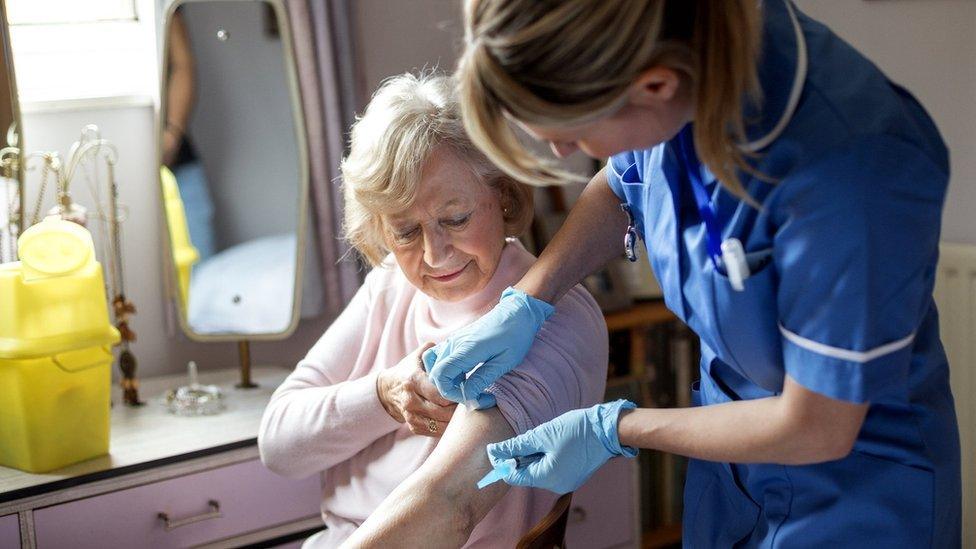Covid in Wales: When will I get the vaccine and what are the priority groups?
- Published
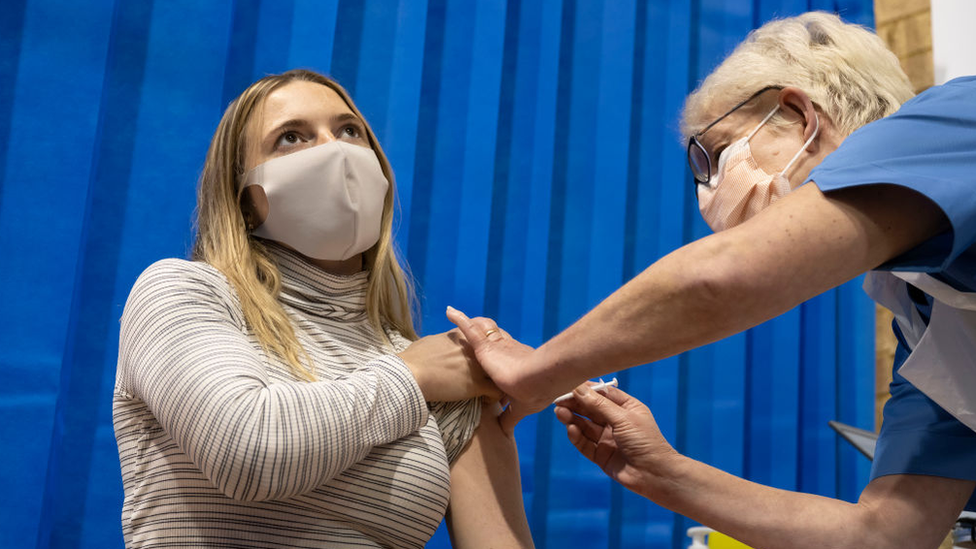
The first Covid-19 vaccines were given in Wales in December
The population of Wales has been split into 10 groups and where you sit broadly determines where you are in the queue to get a coronavirus vaccine.
More than 400,000 people have already been vaccinated in Wales.
The had been early criticism at the speed and approach to the roll-out compared to the other nations of the UK but Wales has since been out in front.
The Welsh Government says it aims to have all over-70s, care home residents and staff, front-line health workers and those extremely vulnerable to the virus vaccinated by mid-February.
Over-50s and younger people with health conditions that put them at higher risk should follow by the spring, all depending on supplies of the vaccine arriving.
All other adults - nearly 1.1 million people - may have to wait until the autumn.
What is the vaccine priority list?
The priority groups used in Wales mirror those in the rest of the UK.
They were drawn up last year by the Joint Committee on Vaccination and Immunisation, external, which advises all of the governments in the UK.
It decided the best plan at the start of the programme was to target those most at risk of severe illness and death from the virus.
The JCVI estimates that people in the top nine priority groups together represent 99% of preventable death from Covid-19.
Welsh Health Minister Vaughan Gething has said the most vulnerable people will be prioritised, with a focus on preventing deaths and protecting the NHS.
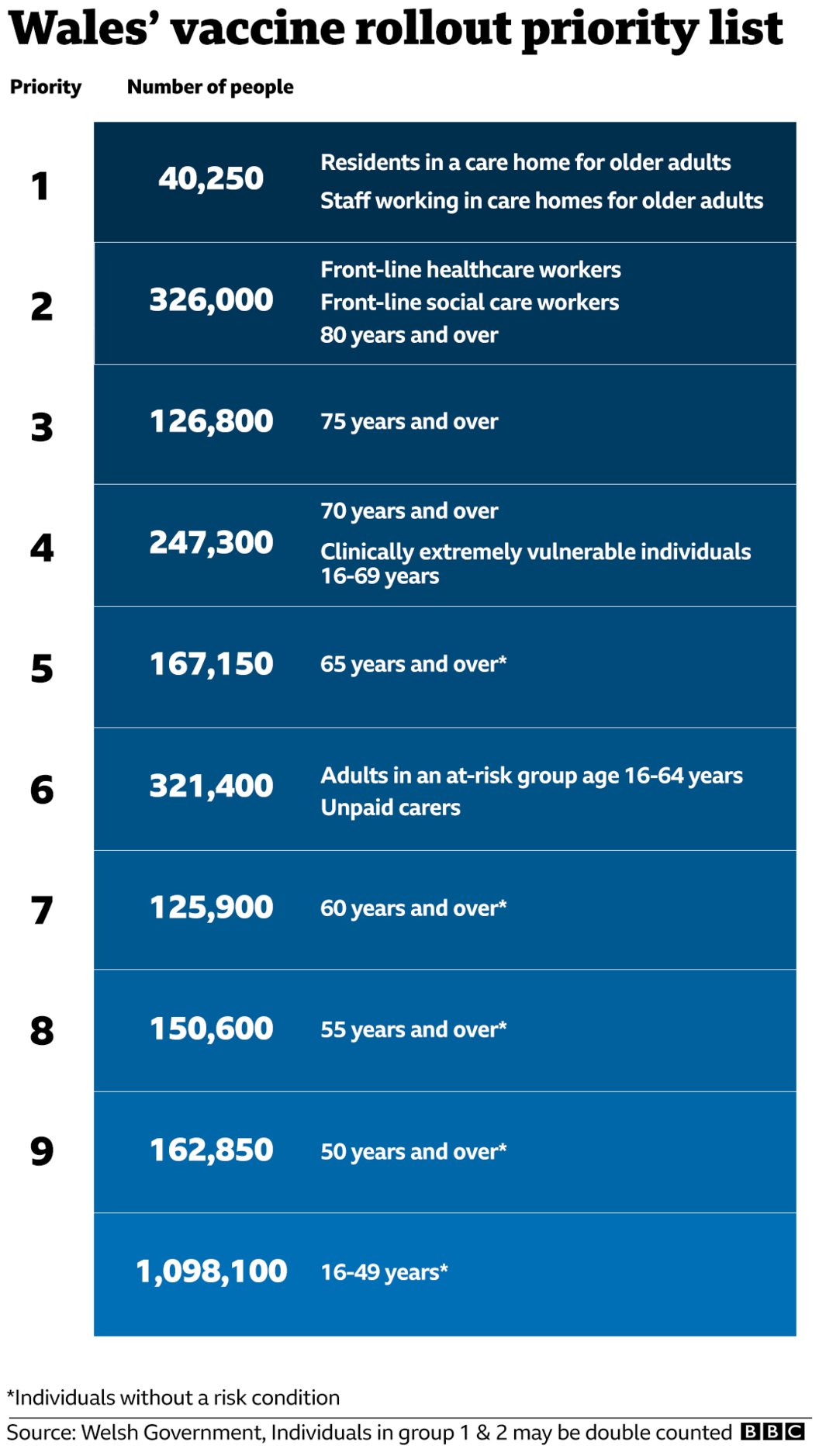

Why are older people at the top of the list?
The JCVI said the single greatest risk of death was from increasing age - and the danger increases exponentially as you get older.
Evidence suggested the risk of death was higher for those aged 65 and over than for most younger adults with underlying health conditions.
It also said older people were more likely to have other risk factors - another reason is backed an age-based programme.
When will front-line workers get the vaccine?
Front-line health and social care workers were at a greater risk of infection, it found.
But there is also a greater risk they transmit the virus to the more vulnerable people they are caring for.
"Even a small reduction in transmission arising from vaccination would add to the benefits of vaccinating this population, by reducing transmission from health and social care workers to multiple vulnerable patients and other staff members," it said in its report.
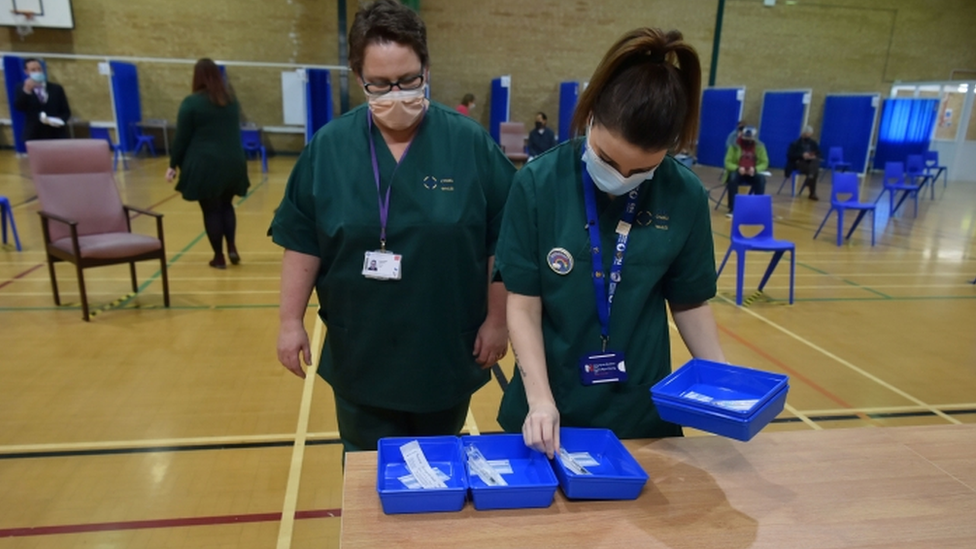
The health minister says the vaccine programme is a "huge task"
I'm a key worker - when will I get the vaccine?
There have been calls for workers outside health and social care to also get their vaccines as a priority.
The Police Federation said officers were risking their own safety and that of their families to enforce lockdown rules.
"These officers finish their shifts and have to go home to their loved ones and families, having come into high risk of contracting Covid," said Marc Jones of the North Wales Police Federation.
Gower MP and former teacher Tonia Antoniazzi opened a Westminster debate saying there was a higher chance of the virus spreading in schools.
The JCVI report said it looked at evidence of the risk of exposure and risk of death in different jobs, but did not advise "further prioritisation by occupation".
It said making the over-50s and those with health conditions the priority would cover almost all preventable Covid deaths, "including those associated with occupational exposure to infection".
But it did say those workers at increased risk of exposure could be the priority in later phases of the programme.
In a statement to the Senedd, external, Mr Gething said the contribution of key workers had been incredible.
But he added: "If large groups of workers were prioritised at an earlier point it would deprioritise other groups of people who are more vulnerable to harm."

'I care for my mother but can't get the vaccine'
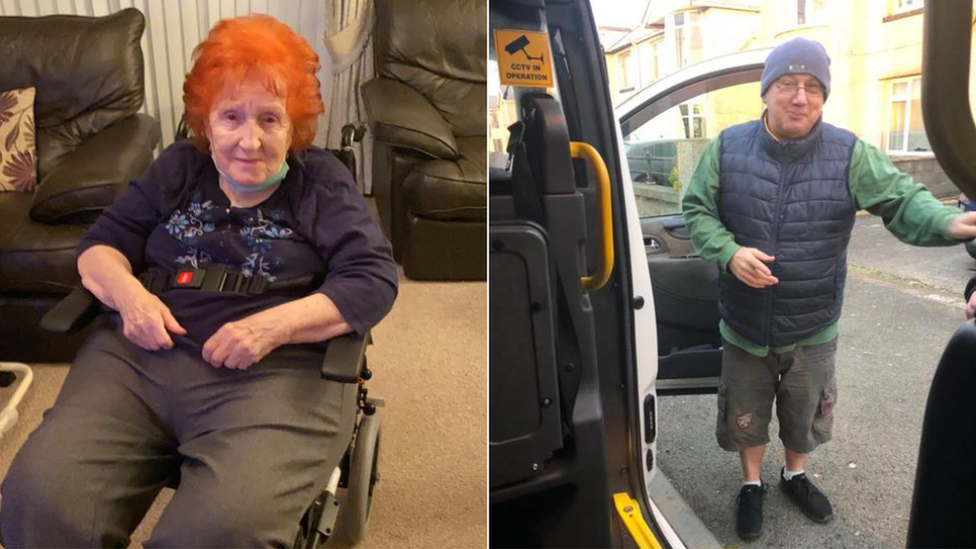
Beryl Thorne moved in with son David in February 2020
David Thorne has been caring for his mother Beryl for most of the past year.
The 61-year-old taxi driver from North Cornelly, Bridgend, took her to get her vaccine but was told he will have to wait for his.
"My mother is 88 years old and has vascular dementia and Alzheimer's disease and blood cancer and heart problems and lost all her mobility," he said.
"I'm her carer, I'm also a self-employed taxi driver and a essential worker."
Mr Thorne said his work, picking up lots of different people, put him at high risk - and he was worried about passing the virus on to his mother.
Health Minister Vaughan Gething said unpaid carers would be in priority group six, in line with the JCVI advice.
The aim is for everyone in that group to be vaccinated by the spring, dependent on supplies arriving.
The JCVI said because there was no data on the effect of the vaccine on transmission of the virus, it cannot yet advise vaccination solely for indirect protection.

I am shielding - where am I in the priority list?
The JCVI pointed out that because many people considered extremely clinically vulnerable had been shielding, the data available will probably underestimate the risk to people in this group.
But it estimated the overall risk to younger people in this group was roughly similar to that of people aged between 70 and 74.
As a result, it advised they should both be in the same priority group - number four - which should see them vaccinated by mid-February, if the Welsh Government's "milestones" were met.
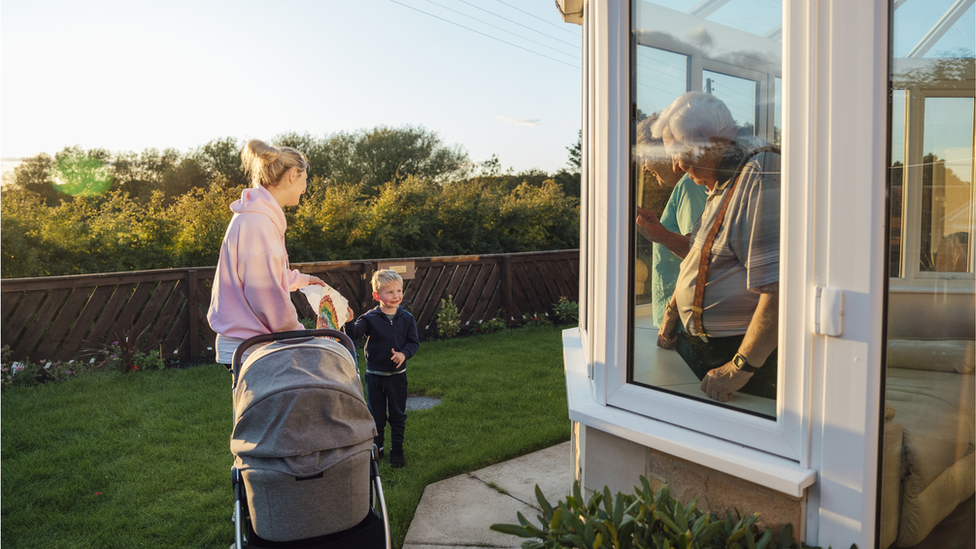
What about people from black, Asian and minority ethnic backgrounds?
The committee agreed there was "clear evidence" people from some of these groups have higher rates of infection, serious disease, and death from Covid-19.
But it said the evidence did not show ethnicity itself was the sole explanation.
Rather, it found some of the health problems and social factors linked to a higher Covid risk were "over-represented" in some BAME groups.
And it said the priority given to people with underlying health conditions would also provide greater vaccination of those communities who are disproportionately affected by such health conditions.

LOOK-UP TOOL: How many cases in your area?
YOUR QUESTIONS: We answer your queries

What is the Joint Committee on Vaccine and Immunisation?
It is an independent group that advises all the UK's health departments.
There are 16 members, with four co-opted members on implementation, and a number of sub-committees.
As well as Covid-19, it looks at things like flu and the human papillomavirus.
It was established in 1963 from an advisory board on polio immunisation.
Source: gov.uk

What next?
The JCVI said data from the first phases of the programme would help it consider vaccination for lower-risk groups.
"The committee is currently of the view that the key focus for the second phase of vaccination could be on further preventing hospitalisation," it said.
And wider use of the vaccines would mean a better understanding of whether they can protect against transmission of the virus, as well as its effects.
Related topics
- Published3 December 2020
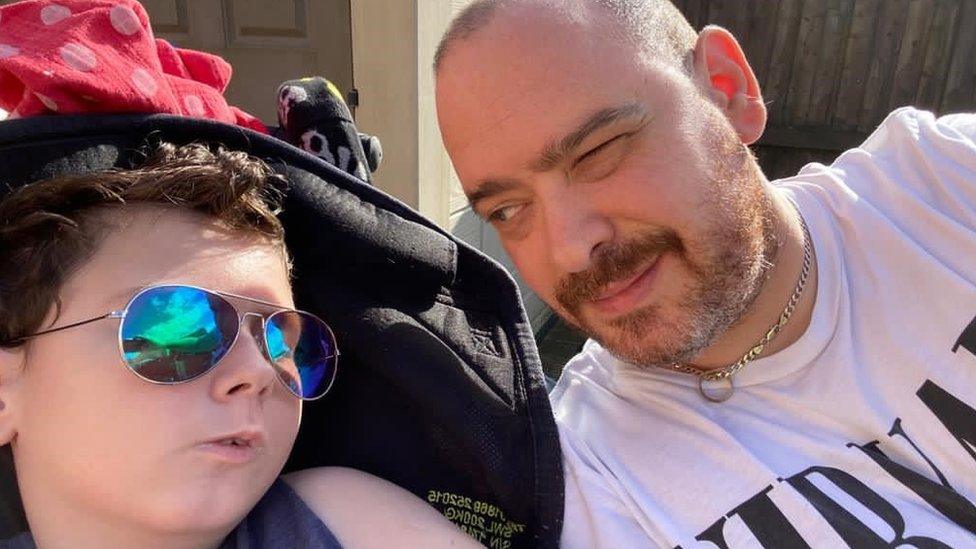
- Published13 January 2021
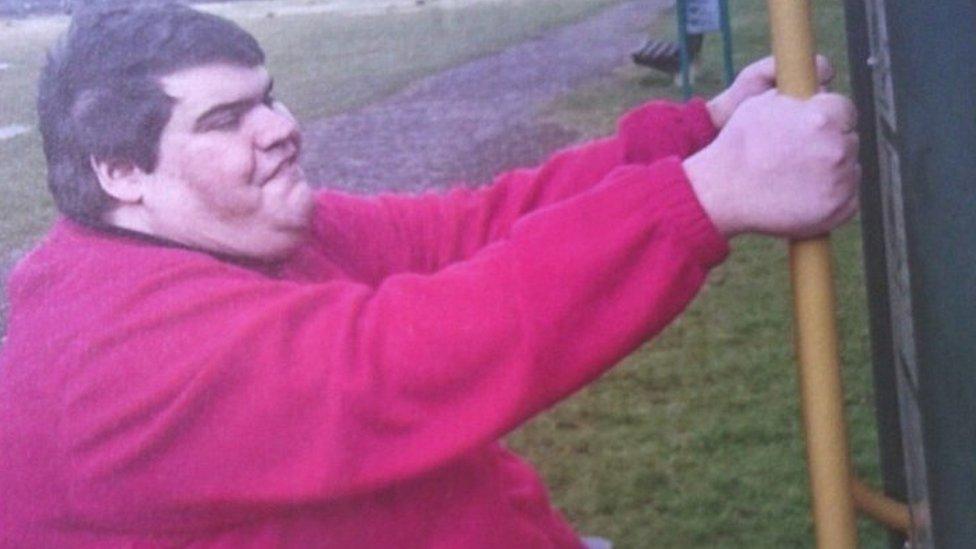
- Published5 January 2021
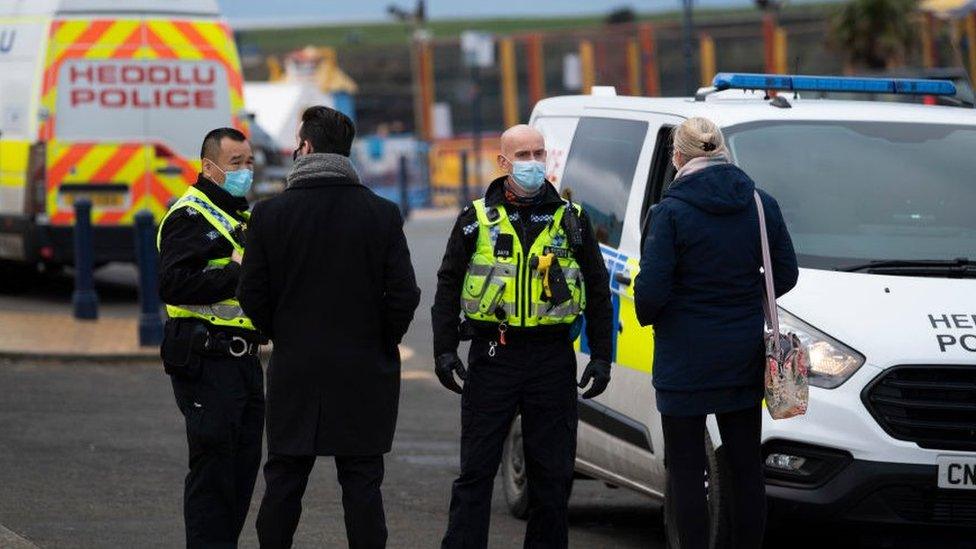
- Published21 January 2021
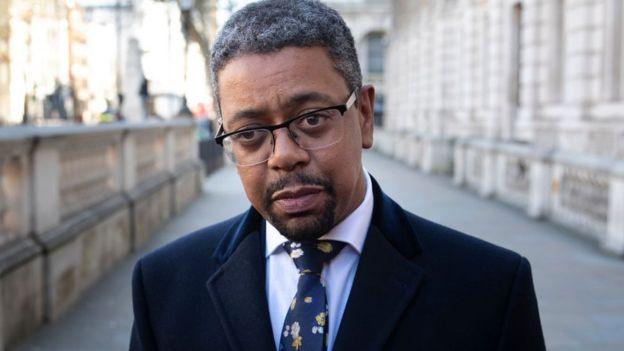
- Published21 January 2021
